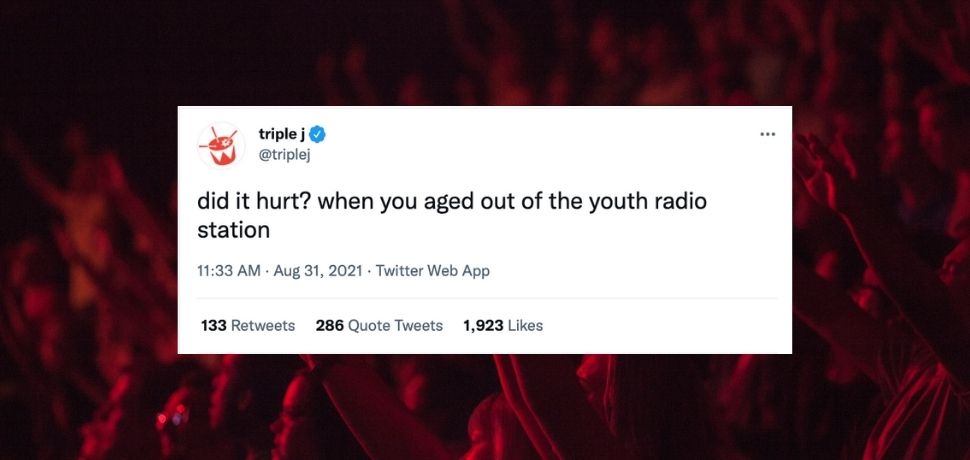We need to talk about *that* triple j tweet

It’s 1am and I can’t sleep. It’s not the usual monkey-mind-imposter-syndrome that is keeping me up though. I can’t sleep because a single tweet has sparked a conversation so many of us have been having in hushed tones for years.
I believe that when triple j posted that conversation-starting tweet yesterday, they were aiming it at music listeners. I’m aware that triple j is a national youth broadcaster with a target demographic. Heck, TIO even published this tongue-in-cheek piece in 2018: Isn’t it weird how triple j lost its way as soon as I got older?.
triple j’s intention was not malicious. They were taking a dig at the fans who, over the years, have made snide comments like: “I like your old stuff better than your new stuff” and posted baiting ‘nobody cares’ memes in mentions of songs by new high rotation artists.

What they did do, albeit inadvertently, was bring attention to an industry-wide problem. And not for the first time, either.
Recently, at the end of a phone call with a publicist, she revealed to me that she’s been made to feel less valuable as a woman over 40 in the Australian music industry.
Another revered industry figure has told me that after multiple comments on a public forum about her appearance, she had to tell fellow executives that they must give her a 15 minute heads-up before any video conference calls. This is so she can put make-up on in an effort to dodge opinions about how tired they think she is.
This music industry has seen the symbolic annihilation of women over 40. They have been aged out of the industry in a way that is so subversive that not only are we losing incredible music (and therefore economic contributions), but we’re also sounding warning bells to emerging acts.
These warning bells tell them they must move quickly if they want a career in music: ‘Quick! Before the joy you’ve had in your life shows up on your face in the form of smile lines! Quick! Before old, white men, sitting in boardrooms stop fantasising about you!’
Over text message the other day a young female artist told me: “I’m just so scared I’m running out of time to succeed.”
This artist has barely begun her career and feels that fear in her bones. In the middle of a global pandemic with all its restrictions—both literal and figurative—our female artists carry this additional stressor, one their male counterparts more easily shirk: that they’ll be aged out of the music business before they even get to make their mark.
Granted, triple j’s tweet was sent with tongue firmly in cheek, a play on the ‘Did it hurt? When you fell from heaven?’ meme. But artists have a right to be angry. They should be livid — triple j is essentially a mirror for an entire industry.
This industry tells female artists over a certain age that they no longer have anything to offer young music fans, but that an all-male band who are pushing 35 are worthy of coveted career signposts like Feature Album, a record deal, or a support slot with a global artist. Women must constantly ‘reinvent’ themselves – their sound, their image, their message. Men, not so much- and certainly not at the pace we expect from women.
I recently made a conscious decision not to include the age of local artists in the news pieces and features I write – no matter how impressive that number is. You won’t see me writing about the ‘19-year-old wunderkind’ who is being championed by a major streaming service, for example.
In her 2017 BigSound keynote, Tina Arena spotlighted this form of sexism:
“…when I performed at Splendour In The Grass, it was good, but everyone kept mentioning my age. Paul Kelly played that festival and no one mentioned his age.”
On the other hand, in a small effort to normalise the ageing process on the industry side of things, I’ve started sharing my own age at appropriate opportunities. I’ll be the first to tell you I’m 34 with no foreseeable plans to leave the industry. And I hope to be 60 and still adding value.
triple j published an ill-advised tweet and I would like to thank them for it. The conversation it started has rallied many of us. We are, again, talking publicly about a topic that has thrived in private for too long. And just like the #metoo movement in Australia, it will take many more conversations, many more keynotes, and many more articles, before we drag this truth out of the shadows for good.
Because the truth, as Tina put it, is quite simple:
“There are women over 40 making music but you won’t hear them on commercial radio, even if they are selling out arenas.”
Check out Tina Arena‘s Bigsound keynote:
This article originally appeared on The Industry Observer, which is now part of The Music Network.

































